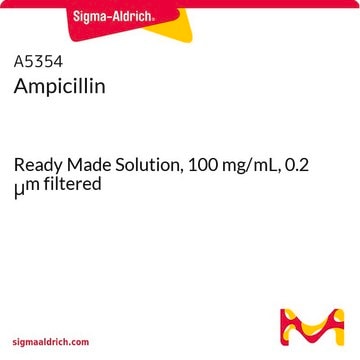A6140
Ampicillin trihydrate
900-1050 μg/mg anhydrous basis (HPLC)
Synonym(s):
α-Aminobenzylpenicillin trihydrate, Aminobenzyl Penicillin, Ampicillin, D-(−)-α-Aminobenzylpenicillin
About This Item
Recommended Products
Quality Level
form
powder or crystals
concentration
900-1050 μg/mg (anhydrous, HPLC)
mp
198-200 °C (dec.) (lit.)
antibiotic activity spectrum
Gram-negative bacteria
Gram-positive bacteria
Mode of action
cell wall synthesis | interferes
storage temp.
2-8°C
SMILES string
O.O.O.CC1(C)S[C@@H]2[C@H](NC(=O)[C@H](N)c3ccccc3)C(=O)N2[C@H]1C(O)=O
InChI
1S/C16H19N3O4S.3H2O/c1-16(2)11(15(22)23)19-13(21)10(14(19)24-16)18-12(20)9(17)8-6-4-3-5-7-8;;;/h3-7,9-11,14H,17H2,1-2H3,(H,18,20)(H,22,23);3*1H2/t9-,10-,11+,14-;;;/m1.../s1
InChI key
RXDALBZNGVATNY-CWLIKTDRSA-N
Looking for similar products? Visit Product Comparison Guide
General description
Application
Biochem/physiol Actions
Other Notes
Signal Word
Danger
Hazard Statements
Precautionary Statements
Hazard Classifications
Eye Irrit. 2 - Resp. Sens. 1 - Skin Irrit. 2 - Skin Sens. 1 - STOT SE 3
Target Organs
Respiratory system
Storage Class Code
11 - Combustible Solids
WGK
WGK 2
Flash Point(F)
Not applicable
Flash Point(C)
Not applicable
Personal Protective Equipment
Choose from one of the most recent versions:
Certificates of Analysis (COA)
Don't see the Right Version?
If you require a particular version, you can look up a specific certificate by the Lot or Batch number.
Already Own This Product?
Find documentation for the products that you have recently purchased in the Document Library.
Customers Also Viewed
Our team of scientists has experience in all areas of research including Life Science, Material Science, Chemical Synthesis, Chromatography, Analytical and many others.
Contact Technical Service







